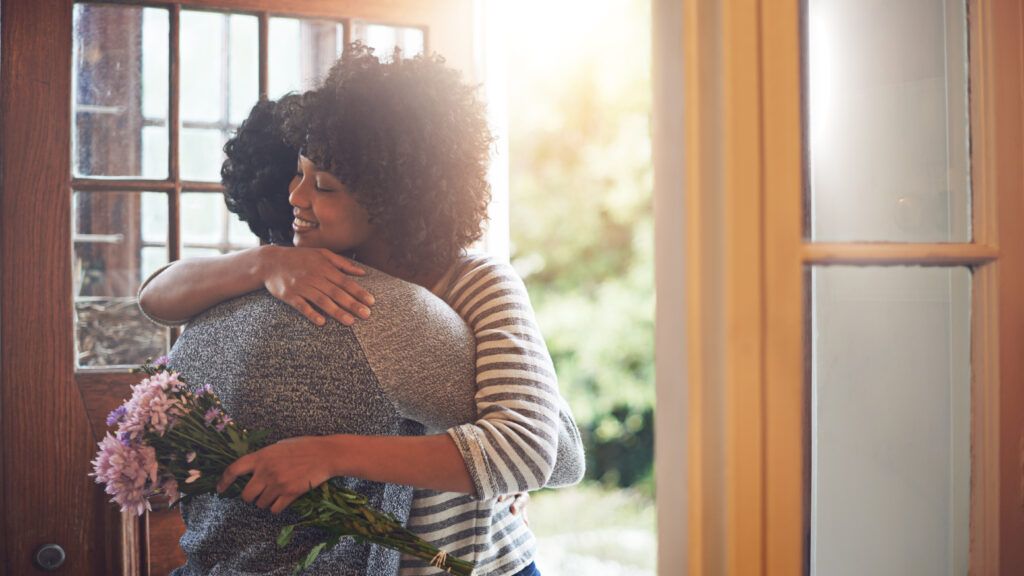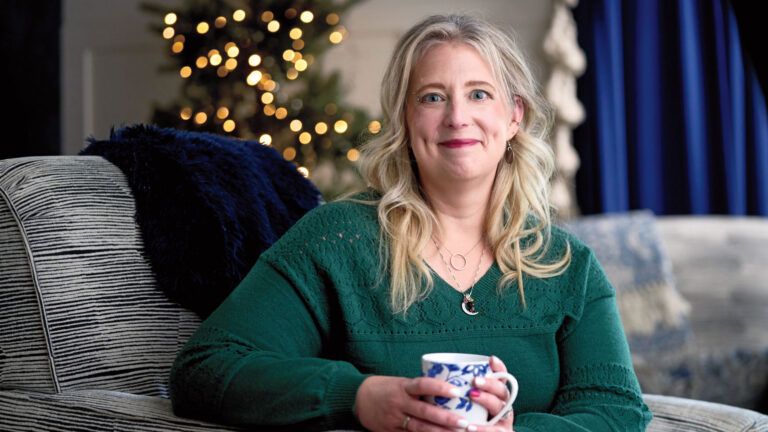October 8, 2011. i was riding my bike home from my office. It’s a gorgeous 12-mile ride on Boston Post Road along the Connecticut coast. The last thing I remember is a vague sense of something behind me, then glancing over my shoulder.
The paramedics managed to keep me alive till I got to the hospital, but there was no stopping the bleeding. The front left tire of the six-wheel freight truck had crushed me first, then the back double tires rolled over me. My abdomen and pelvis were ripped apart. I coded over and over again. I was kept in a medically induced coma for more than a month. When I came out, I should have been glad to be alive. But the pain was so intense, so excruciating, I thought I would never recover.
Recover is what I did. Today I’m strong enough to run, swim and bike—even compete in triathlons (more on that later)—but the pain is still a major part of my life. Like millions of people, maybe even you, pain is something I have learned to live with every day. Here is what helped me.
Give yourself goals.
This lesson came to me early in my recovery, and it’s something I’ve put in practice again and again.
After six weeks in the hospital and dozens of surgeries, I was transferred to Gaylord Specialty Healthcare, a rehabilitation facility. I’d always been healthy, active and independent. Now there was nothing I could do on my own. I didn’t want to go on living, not like this.
My second day there, a nurse came into my room and asked, “What’s your goal for today?”
“I can’t keep food down, I can’t get out of bed, I can’t walk, I can barely stand up. You tell me what my goal should be.”
“Wound care,” she said. “Just getting wound care will be your goal today. That should be enough.”
At once I understood. I needed to give myself credit for accomplishing even the smallest goals. Rolling over in bed, swallowing a bite of food, getting a few hours of uninterrupted sleep. Those were great achievements. A week later, when three nurses showed up and said, “It’s time to try walking.” I was ready. I took just a few steps, but that was my goal that day.
Ask for help.
I’ve never liked asking for help, and I still don’t. But that’s one big way pain can isolate you. It can keep you prisoner if you let it.
My husband, Sean, was a constant presence, helping me change my bandages. I didn’t want others to see what a mess I was. And yet I couldn’t stop them from visiting. I’m so grateful I didn’t. People sent cards and care packages, organic juices and teas. A girlfriend brought me a prayer shawl she’d made. Another came with pictures of my favorite hiking spots. The message was clear: “Colleen, you’ll go back there someday.”
At first I couldn’t believe what they wanted to believe for me. Pain made me negative. I couldn’t accept their prayers. At last I did. What choice did I have? I couldn’t do it alone. We are meant to help each other. It can be the greatest pain relief.
Blame God.
For a while I couldn’t even pray. I was too angry. “God,” I wanted to say, “why didn’t you just let me die on the asphalt? Why do I have to suffer like this?” One morning I wouldn’t even let the nurses clean my wounds. I was in too much pain. The chaplain came to see me later that day. He sat with me and read Scripture.
“I have no right to blame God,” I said to him guiltily.
“You do have that right, Colleen. Of course you do. Look in the Bible. Look at the range of emotions expressed in the Psalms. We can say anything to God. He can take it.”
He explained that if a friend were angry with us, wouldn’t we want to know? Wouldn’t we want to hear? So does God. Soon I became unflinchingly honest in my prayers. I still am. Don’t let pain isolate you spiritually. God is there with us at the best of times and the worst.
Help others.
The chaplain suggested I visit some of the other patients. “But I wouldn’t know what to say,” I complained. What good would I be in my state? How would I be able to help someone else?
There was a young man Sean kept talking about, a musician who’d been paralyzed in a car accident. Maybe if Sean wheeled me over to his room.
I felt like an idiot. His mom was there. The guy couldn’t even speak. I took his hand—he had no feeling in it—and the two of us just stared at each other. Then his mom said he’d like us to hear the music he’d been working on. It was on his iPad. “He shows me with his eyes where to tap on the keyboard,” she said. She pulled up the program and we listened. That was all we could do, and yet it was everything to the young man.
Giving to others releases endorphins in us. Endorphins are major pain mediators. And one of God’s great gifts to us.
Practice gratitude.
Just before Christmas, I went home. I could go short distances with a walker; otherwise, the pain was debilitating. I fell into depression, my mind fixating on the hundreds of thousands of dollars we owed in medical expenses, the job I’d lost, the feeling that life would never get back to normal. I was stuck.
One afternoon, a woman called out of the blue—I have no idea who she was. “Colleen,” she said, “I’ve been following your story in the newspaper.” We live in a small coastal town, and the news had gotten out. “What I want you to know is that your life still has a purpose. You were saved for a reason.”
This was such an odd message—from a complete stranger, no less. It got me thinking about all the people who had kept me alive: the paramedics, the ER doctors, the nurses, my physical therapists, speech therapists, the people who donated blood. I went through 78 units of blood and 25 bags of plasma within 48 hours. That translated to at least 180 people. How could I ever pay them back? I couldn’t, of course. No way. But I could make sure I was grateful.
More than that, I could show my gratitude. I organized a fund-raiser for the rehab hospital, a short road race that I did with my walker, each step a minor victory. Soon I was strong enough to walk without that walker. I strengthened my body by riding an exercise bike and swimming at the rec center. Before long, I was running again and faced my fear of biking outside. I saw a notice about a short triathlon: a 500- yard swim, 10-mile bike ride and 5k run. Why not? I finished dead last—with Sean by my side—but to me it felt like I’d won an Olympic gold medal.
I compete now in some sort of race almost every month. I’ve done Ironman triathlons and long bike rides. Most of them are benefits for some cause, but even if they’re not they’re reminders I’m grateful simply to be alive, even with pain. In fact that pain is the greatest reminder—an affirmation—that I am still alive.
Face your fears.
Pain escalates when accompanied by fear. And anyone who has been a victim of trauma will find that fear can return at a moment’s notice.
I knew I had to get back to driving, but I dreaded putting myself back on the road. I started out on small back roads, places where there was no chance of painful memories being revived. Then one day I had to drive to a therapy appointment, and I pulled onto Boston Post Road, not far from where I’d been run over. Ahead of me was a freight truck parked on the side of the road. The same model truck that had run over me. The same company.
My hands gripped the steering wheel, anger rising inside me. I parked my car and walked over to the truck, shaking, crying. The driver stepped out. He wasn’t the one who had hit me, but at this point it hardly mattered. “Are you okay, ma’am?” he asked.
“I was run over by one of these trucks,” I said. I lifted my shirt to show him the scars across my abdomen, the tire marks.
“What can I do for you?” he said.
I wasn’t even sure. “Let me stand here,” I said.
“Take all the time you need,” he said. He turned off the engine, and I walked to the front of the truck, touched the tires. I wanted to feel them without being in danger. I ran my fingers over the treads and smelled the beast that had almost taken my life.
But hadn’t. By God’s grace, I was alive. I gave the driver a hug, then made him promise to practice safety when he was on the road.
“I’m sorry,” he said, and that was all. But it was enough. I got back in my car and called Sean, who wanted to come get me. No, I told him, I was ready to move on. I had faced the thing that I feared most.
The pain is always present in my legs and abdomen. I’ve learned to accept it as my new normal, a hurdle to be overcome, not a wall. I monitor my blood pressure while exercising and slather cream over my injured areas to protect the skin. Most of all, I take steps to lower my stress—sleeping more, eating right, praying lots. I’ll never be the person I was, but that’s okay. I’m too busy being the woman I am today.
For more inspiring stories, subscribe to Guideposts magazine.
6 Life Lessons from Injuries |






